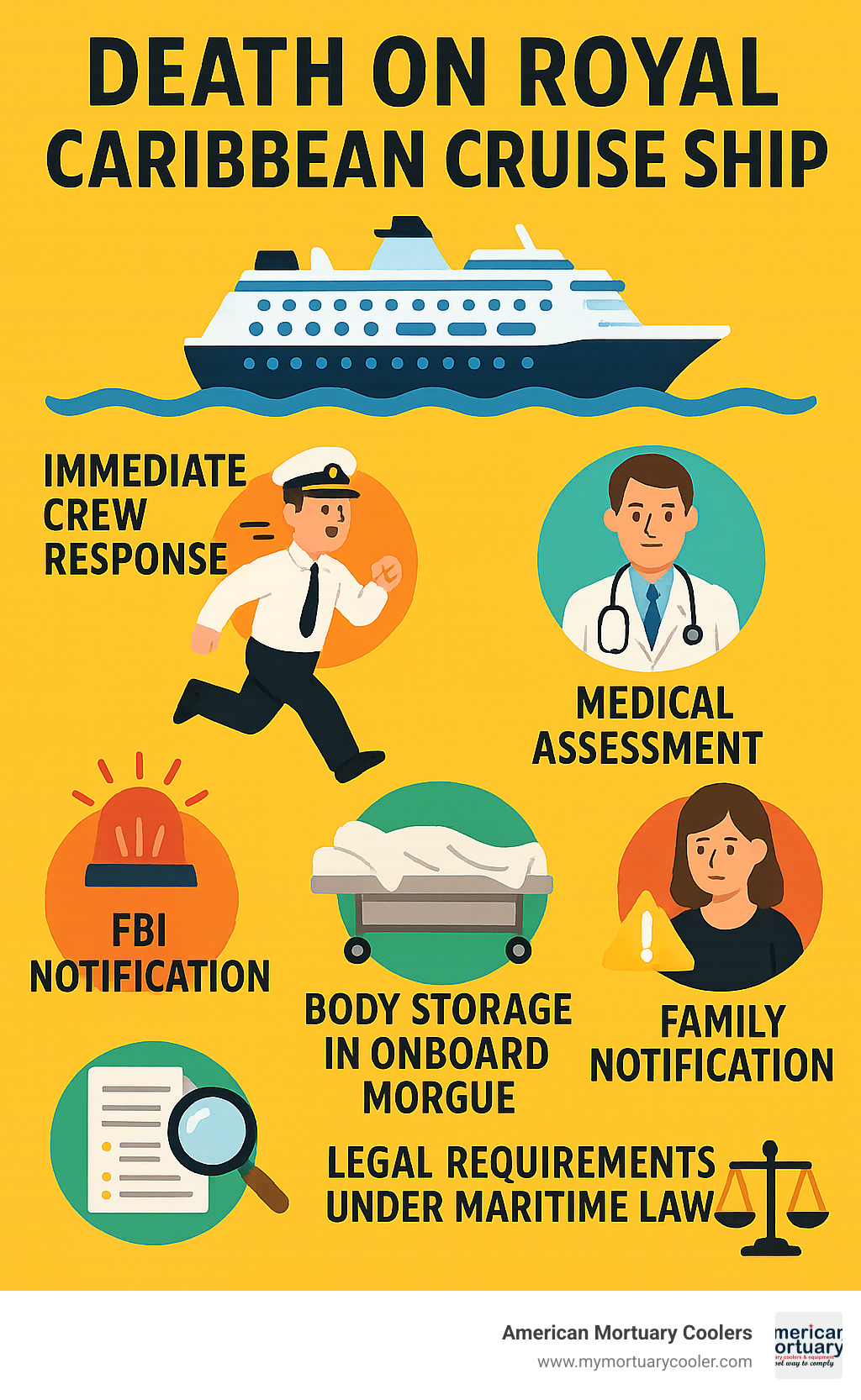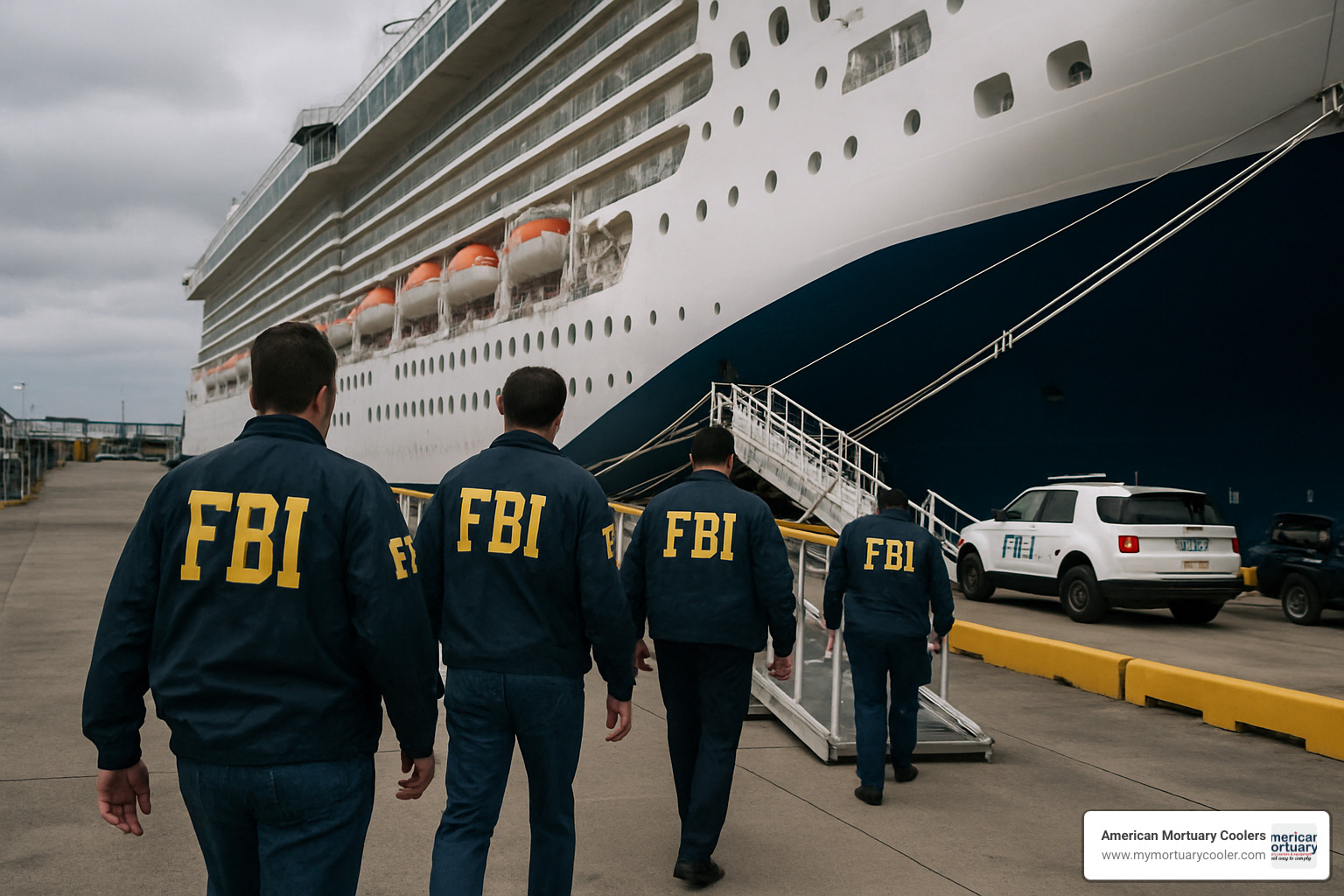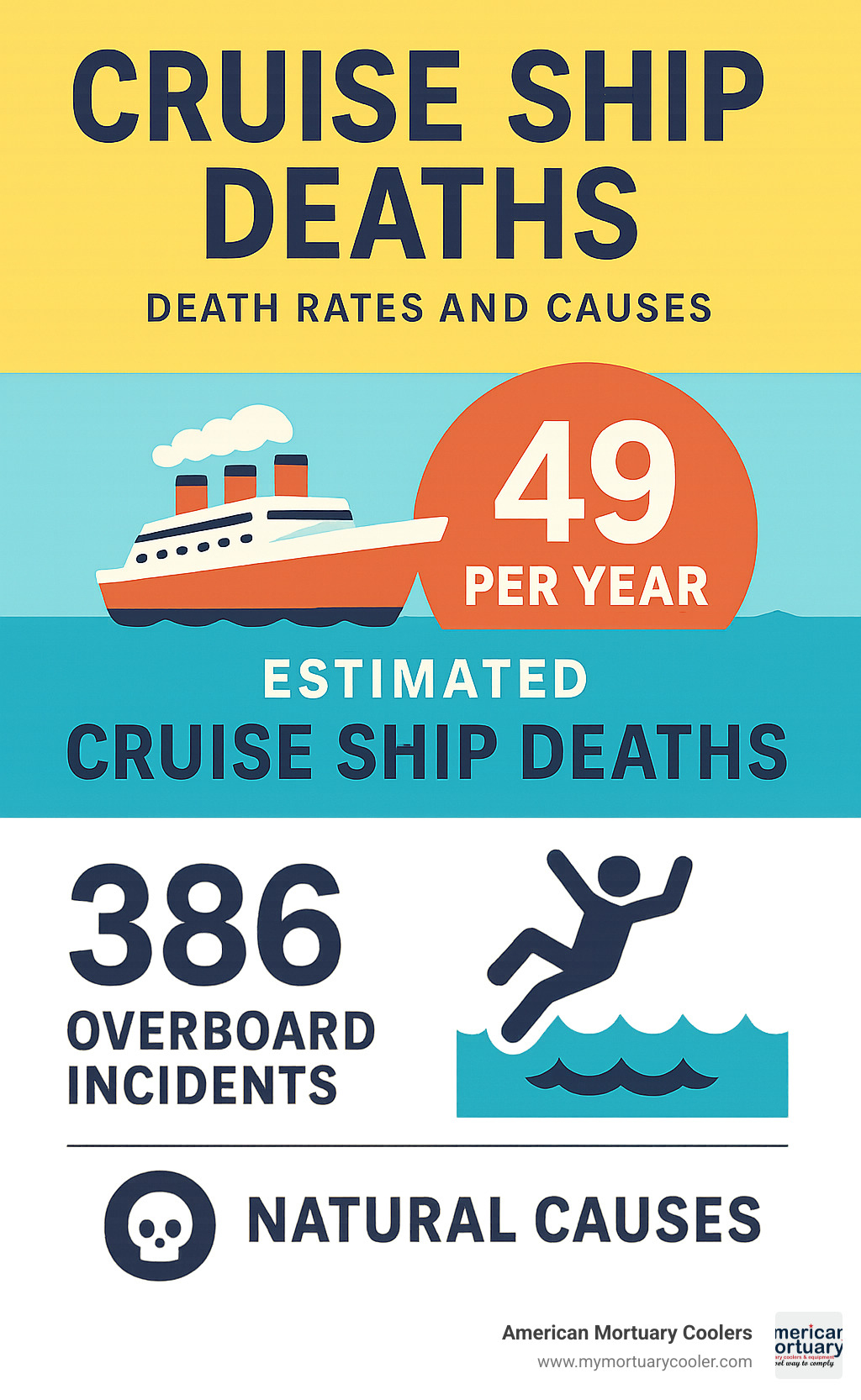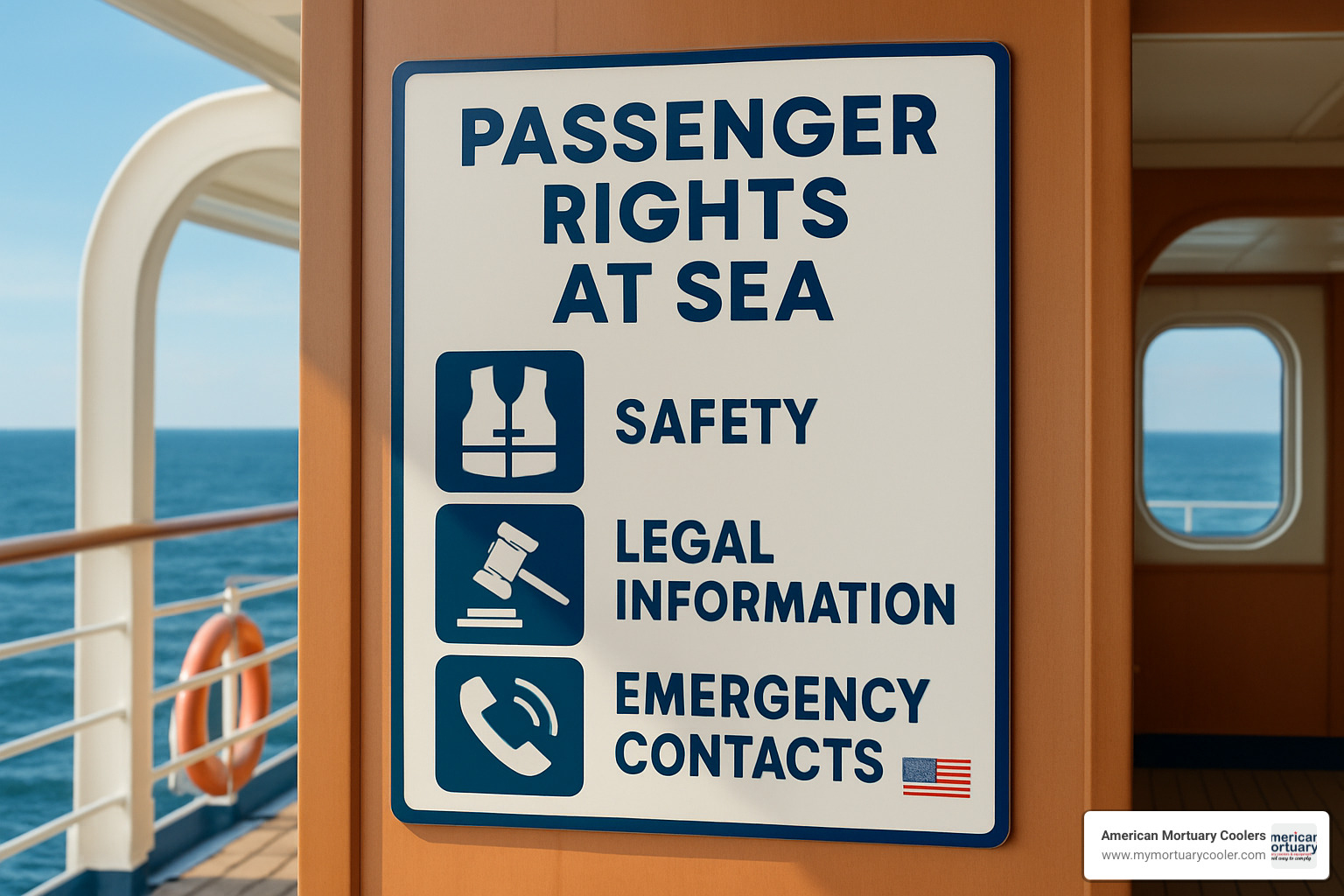Why Understanding Deaths on Royal Caribbean Cruise Ships Matters
Death on Royal Caribbean cruise ship incidents have gained significant media attention following the December 2024 case of Michael Virgil, a 35-year-old passenger who died after being restrained by crew members aboard the Navigator of the Seas. The FBI is currently investigating this incident, which has raised serious questions about cruise ship safety protocols and passenger rights.
Key Facts About Recent Royal Caribbean Deaths:
- Michael Virgil Case (December 2024): Passenger died after being restrained with zip ties, pepper spray, and allegedly sedatives during an onboard disturbance
- FBI Investigation: Federal authorities boarded the ship in Los Angeles to investigate the circumstances
- Family Allegations: Relatives claim security injected Virgil with sedatives, contributing to his death
- Maritime Law: Deaths at sea fall under federal jurisdiction with a one-year statute of limitations for wrongful death claims
- Industry Statistics: Between 2000-2020, at least 386 people went overboard from cruise ships worldwide
The Virgil case highlights broader concerns about how cruise lines handle unruly passengers and medical emergencies. Witness Christopher Mikhail told Fox 11: "The gentleman that was drunk said he was going to kill us... He started chasing us down the hallway."
Royal Caribbean has faced multiple fatalities in recent years, including balcony falls, excursion accidents, and medical emergencies. The cruise line maintains that safety is their top priority, but families and legal experts question whether current protocols adequately protect passengers.
As American Mortuary Coolers, we've worked extensively with funeral homes and maritime facilities to understand the complex logistics of handling deaths at sea. Our experience with cruise ship morgue operations and mortuary equipment has given us unique insights into how death on Royal Caribbean cruise ship incidents are managed from both operational and legal perspectives.

Essential death on royal caribbean cruise ship terms:
Why This Guide Matters
The tragic death of Michael Virgil aboard the Navigator of the Seas has brought unprecedented attention to cruise ship safety protocols and passenger rights. Family members describe his behavior as completely out of character, raising questions about what triggered the fatal confrontation with security personnel.
For families planning cruise vacations, understanding your rights and the cruise line's responsibilities is crucial. The maritime legal system operates differently from land-based law, with unique jurisdictional issues and shorter statute of limitations periods that can affect your ability to seek justice.
The Michael Virgil Case: What Happened and When
The tragic death on Royal Caribbean cruise ship Navigator of the Seas on December 13, 2024, shocked passengers and crew alike. Michael Virgil, a 35-year-old man traveling with his fiancée and 7-year-old autistic son, died within hours of what started as a routine cruise departure from Los Angeles to Ensenada, Mexico.
The incident has sparked an ongoing FBI investigation into the death of a Royal Caribbean guest, raising serious questions about cruise ship security protocols and passenger safety procedures.
13 December 2024 – Initial Disturbance
The trouble began shortly after the Navigator of the Seas left port. Passengers started noticing Michael Virgil behaving erratically in the ship's corridors. Cell phone footage captured him in what witnesses described as a profanity-laced rant, clearly agitated and increasingly aggressive.
Christopher Mikhail, a fellow passenger, found himself trapped in a hallway as the situation escalated. "I was kind of scared, I'm stuck in this hallway," he later told reporters.
Witnesses reported that Virgil was repeatedly kicking at cabin doors while crew members tried desperately to calm him down. The situation reached a breaking point when Virgil allegedly began chasing other passengers through the ship's narrow corridors. According to multiple witness accounts, he made verbal threats, with one passenger reporting that "the gentleman that was drunk said he was going to kill us."
Security Detainment & Medical Emergency
When ship security finally intervened, they used multiple methods to subdue Virgil. Security personnel first deployed pepper spray to initially subdue him. When that wasn't enough, they used zip ties to physically restrain his hands and arms. Witnesses described seeing crew members using towels to hold him down on the deck floor.
The most controversial aspect involves family allegations that security personnel injected Virgil with some type of sedative after the physical restraints were applied. While this claim hasn't been officially confirmed, it's become a key focus of the investigation and the family's wrongful death concerns.
Within approximately one hour of being taken into custody, Michael Virgil was dead. The ship's infirmary staff were involved, but details about their specific medical response haven't been released publicly.
Docking in Los Angeles & FBI Boarding
The Navigator of the Seas continued its scheduled itinerary to Ensenada, Mexico, before returning to Los Angeles on December 16, 2024. When the ship docked, FBI agents immediately boarded the vessel to begin their investigation. The FBI's Evidence Response Team spent considerable time processing the scene, collecting physical evidence, and interviewing witnesses.
The Los Angeles County Medical Examiner has deferred ruling on the cause of death pending completion of the investigation. Royal Caribbean issued a brief statement expressing their condolences: "We are saddened by the passing of one of our guests. We offered support to the family and are working with authorities on their investigation."
The investigation status remains active, with the FBI continuing to analyze evidence and interview witnesses.
Official Investigations, Autopsy Results, and Legal Ramifications

When a death on Royal Caribbean cruise ship happens in international waters, the FBI takes charge of the investigation. The FBI's Evidence Response Team boarded the Navigator of the Seas when it returned to Los Angeles. They're asking the tough questions that need answers: Was too much force used to restrain Michael Virgil? What exactly caused his death? Did the crew follow proper safety rules?
The Cruise Vessel Security and Safety Act requires cruise lines to keep detailed records of incidents and work with investigators. This 2010 law was created after too many cruise ship incidents went uninvestigated or poorly handled.
Here's where things get tricky for grieving families. Maritime law operates under 46 USC § 30526, which gives families just one year to file wrongful death claims. That's much shorter than most other types of lawsuits.
Cruise lines do have a duty of care to their passengers. They must provide proper medical facilities, trained security staff, and safe restraint methods that don't put passengers at additional risk. Scientific research on restraint fatalities shows that combining multiple restraint methods can be dangerous, especially when someone is already agitated.
The Los Angeles County Medical Examiner has held off on ruling the cause of death until the investigation wraps up. This delay is frustrating for the family, but it's common in cases where the circumstances are complicated.
Standard Cruise Line Protocols During a Death on Royal Caribbean Cruise Ship
When a death on Royal Caribbean cruise ship occurs, there are specific steps that must be followed. Security personnel receive training in threat recognition and de-escalation techniques. The goal is always to calm situations down before they get physical. They also learn basic emergency medical response and how to preserve evidence for later investigation.
The ship's medical staff plays a crucial role too. They're supposed to assess passengers before and during any restraint situation. Having proper medical evaluation could prevent tragedies like what happened to Michael Virgil.
Through our work at American Mortuary Coolers, we've learned a lot about how cruise ships handle deaths. Understanding Cruise Ship Morgue Operations explains that these ships are actually well-equipped for storing bodies. They have refrigerated storage compartments that maintain proper temperatures, individual body storage areas, and secure access controls.
Most cruise ships can store between 2-6 bodies for up to a week. The International Maritime Organization works with the U.S. Coast Guard to make sure cruise lines follow international safety standards.
Passenger & Family Statements
The most heartbreaking part of this story is hearing from Michael Virgil's family. They keep saying the same thing - this wasn't like him at all. He was traveling with his 7-year-old autistic son and had no history of violence or aggressive behavior.
His fiancée and relatives are asking reasonable questions. If sedatives were used, who authorized that? Was a doctor involved? How long did they try to calm him down before using physical restraint? And most painfully - could this death have been prevented?
The family has focused their concerns on several key issues: the alleged use of sedatives by ship security, whether proper medical evaluation happened before restraint, if enough de-escalation attempts were made, and the timeline between restraint and death.
Royal Caribbean has offered the family support services, including grief counseling and help with bringing Michael's body home. While this support is important, it doesn't answer the family's questions about what went wrong.
How Common Are Cruise-Ship Deaths? Stats, Trends, and Prevention

Industry data reveals that deaths on cruise ships, while tragic, occur at rates similar to land-based populations when adjusted for demographics. However, certain types of incidents are unique to the maritime environment.
Key Statistics:
- 386 overboard incidents occurred between 2000-2020 across all cruise lines
- Natural causes account for the majority of cruise ship deaths
- Balcony falls represent a significant safety concern, particularly for minors
- Excursion accidents during snorkeling, kayaking, and diving activities
Royal Caribbean's Harmony of the Seas has experienced at least three fatal balcony falls involving minors since 2019, highlighting ongoing safety challenges despite regulatory requirements for 42-inch railings and safety barriers.
The Cruise Vessel Security and Safety Act of 2010 mandates specific safety measures:
- Balcony railings not less than 42 inches above deck level
- Solid panels underneath railings to prevent slipping
- Emergency response protocols for overboard incidents
- Mandatory reporting of crimes and suspicious deaths
Recent High-Profile Cases Beyond the Virgil Incident
Several recent incidents illustrate the variety of fatal situations that can occur aboard Royal Caribbean vessels:
December 2024 - 12-Year-Old Balcony Fall: A boy fell to his death from the Harmony of the Seas while returning to Galveston, Texas. The FBI is investigating this incident in coordination with the U.S. Coast Guard and Customs and Border Protection.
2023 - Snorkeling Death in Dominica: A California tourist died during a snorkeling excursion while the ship was docked in Dominica. The incident highlights risks associated with shore excursions and water activities.
2023 - Crew Member Drowning: A Royal Caribbean musician was found dead, demonstrating that fatalities affect both passengers and crew members.
Understanding Cruise Passenger Deaths: Causes & Prevention
The most common causes of death on Royal Caribbean cruise ship incidents include:
- Natural Causes - Heart disease, strokes, and other medical conditions account for the majority of cruise deaths
- Accidental Falls - Balcony incidents, slip-and-falls, and stairway accidents
- Drowning - Pool accidents, excursion mishaps, and overboard incidents
- Violence - Rare but serious incidents involving passenger altercations or crew conflicts
Understanding Cruise Passenger Deaths: Causes & Prevention provides detailed analysis of risk factors and prevention strategies.
Prevention measures include:
- Improved safety briefings covering balcony safety and emergency procedures
- Improved medical screening for passengers with high-risk conditions
- Better crew training in de-escalation and emergency response
- Upgraded safety equipment including better railings and monitoring systems
Know Your Rights and Responsibilities at Sea

When you step aboard a cruise ship, you're entering a unique legal environment that's quite different from what you'd experience on land. Understanding your rights when a death on Royal Caribbean cruise ship occurs can make all the difference for families facing these heartbreaking situations.
The moment you book your cruise, you're agreeing to a ticket contract that often includes some pretty significant legal restrictions. Many of these contracts require you to resolve disputes through mandatory arbitration rather than going to court. They also typically specify exactly where any legal proceedings must take place - often in Florida for Royal Caribbean cases, regardless of where you live.
If you witness or are involved in a serious incident, you may have reporting duties that require you to cooperate with investigations. Evidence preservation becomes absolutely critical if you're considering legal action. That cell phone video, those text messages you sent to family, even the clothes you were wearing - all of these could become important evidence.
Here's something that catches many families off guard: maritime law gives you just one year from the date of the incident to file a wrongful death claim under 46 USC § 30526. This is much shorter than most land-based cases, where you might have two to three years. Missing this deadline doesn't just hurt your case - it can eliminate it entirely.
Travel insurance can be a lifesaver in these situations, potentially covering everything from emergency medical evacuation to legal expenses and repatriation costs.
As a passenger, you have fundamental rights that cruise lines must respect. You're entitled to adequate medical care during emergencies, which means the ship's medical staff should be properly trained and equipped. If security needs to intervene, they must use reasonable force - not excessive restraint that could endanger your health or life.
When a death occurs, you have the right to have it properly investigated by the appropriate authorities, whether that's the FBI, Coast Guard, or local law enforcement depending on where the incident happens. You also have the right to mental health resources and grief counseling, though you may want to seek independent support as well.
6 Things to Do If You're Serious About Royal Caribbean Cruise Ship Deaths provides detailed guidance that we've developed based on our years of experience working with families and funeral homes dealing with these complex situations.
What To Do If a Death on Royal Caribbean Cruise Ship Occurs During Your Voyage
Nobody wants to think about witnessing a fatal incident during what should be a relaxing vacation, but being prepared can help you respond appropriately if the unthinkable happens.
Your first priority should always be to notify the crew immediately. Alert ship security and medical personnel as quickly as possible. Don't assume someone else has already called for help - in emergency situations, multiple reports are better than none.
If it's safe and appropriate to do so, document what you observe. Take photos or videos, but never put yourself or others at risk to get footage. The cell phone video from the Michael Virgil case became crucial evidence, but only because passengers were able to record safely from a distance.
Preserve any evidence you might have. Keep the clothes you were wearing, save text messages or photos from your phone, and hold onto receipts or other documents from that day. What seems unimportant in the moment could become vital evidence later.
Contact your family as soon as you're able. Let them know what happened and consider consulting with a maritime attorney quickly, especially given that short one-year deadline. Having legal guidance early can help you avoid mistakes that might hurt your case later.
You'll need to cooperate with authorities when they investigate. Be honest and thorough in your statements, but don't be afraid to ask for clarification if you don't understand a question. Investigators from the FBI, Coast Guard, or local authorities may all want to speak with you.
Finally, don't neglect your own wellbeing. Seek counseling if you need it. Witnessing a death or serious incident can be traumatic, and there's no shame in getting professional help to process what you've experienced.
Support Resources for Families
When a death on Royal Caribbean cruise ship occurs, families suddenly find themselves navigating an overwhelming maze of logistics, legal issues, and grief. Royal Caribbean does provide support services, but it's important to understand both what they offer and what independent resources might be helpful.
The cruise line's care teams are available 24/7 to help with immediate crisis support and information. They can connect you with grief counseling through licensed mental health professionals and help coordinate repatriation arrangements to bring your loved one home. They'll also provide legal liaison services to help you understand your basic rights under maritime law.
However, families should also consider independent resources that aren't affiliated with the cruise line. Maritime attorneys who specialize in cruise ship incidents can provide objective legal advice about your rights and options. Mental health professionals who aren't connected to Royal Caribbean can provide counseling without any potential conflicts of interest.
At American Mortuary Coolers, we've worked with many families and funeral homes dealing with the complex logistics of repatriating deceased passengers from cruise ships. Our experience with national mortuary shipping and understanding of cruise ship morgue operations can help families steer these difficult arrangements during an already challenging time.
Frequently Asked Questions about Deaths on Cruise Ships
When families face the unthinkable tragedy of a death on Royal Caribbean cruise ship, they're often overwhelmed with questions about what happens next. These situations are complicated by maritime law, international jurisdictions, and cruise line policies that most people never encounter in their daily lives.
Who investigates a death on Royal Caribbean cruise ship?
The answer depends on where the ship is when the incident occurs, but it's usually more complex than families expect. The FBI takes the lead when deaths involve U.S. citizens on the high seas, which covers most situations involving American passengers on Royal Caribbean ships.
The FBI doesn't work alone, though. They coordinate closely with the U.S. Coast Guard, Customs and Border Protection, and local authorities when ships return to U.S. ports. Their Evidence Response Team boards the vessel to process crime scenes and collect physical evidence - just like they did with the Michael Virgil case in December 2024.
Things get more complicated when ships are in foreign waters or docked at international ports. Local authorities may also claim jurisdiction, creating legal situations that can drag on for months. This is why having experienced maritime attorneys becomes so important for families seeking answers.
Does the cruise line have a morgue on board?
Yes, and this surprises many people. Every major Royal Caribbean ship maintains sophisticated onboard morgue facilities designed to handle multiple fatalities if necessary. These aren't makeshift storage areas - they're professionally designed refrigerated facilities.
At American Mortuary Coolers, we've worked extensively with maritime facilities, so we understand exactly what these morgues entail. Royal Caribbean ships typically feature individual refrigerated compartments that maintain temperatures between 36°F and 39°F - the same standards used by funeral homes on land.
The morgues are constructed with stainless steel for sanitary conditions and include proper ventilation systems. Access is strictly limited to authorized medical and security personnel, and the facilities can store bodies for up to one week during extended voyages.
Most cruise ship morgues can accommodate 2-6 bodies depending on the vessel size. Larger ships like the Navigator of the Seas (where Michael Virgil died) have more extensive facilities than smaller vessels.
Can families sue Royal Caribbean after an onboard fatality?
This is often the most pressing question for grieving families, and unfortunately, the answer is complicated by maritime law. Families can pursue wrongful death claims, but they face unique legal problems that don't exist with land-based incidents.
The biggest challenge is time. Maritime law gives families just one year from the date of the incident to file wrongful death claims under 46 USC § 30526. This is dramatically shorter than most land-based statutes of limitations, which typically allow 2-3 years or more.
Cruise contracts also create additional obstacles. Most tickets include mandatory arbitration clauses that prevent families from taking cases to traditional courts. There are also venue restrictions that limit where cases can be filed, often forcing families to pursue claims in Florida regardless of where they live.
Jurisdictional issues add another layer of complexity. When incidents occur in international waters or foreign ports, determining which country's laws apply can take months to resolve.
Despite these challenges, families can pursue several types of claims. Negligent security practices are often central to cases involving passenger restraints, like the allegations in the Virgil case. Families may also claim inadequate medical response, failure to follow proper restraint protocols, or breach of the cruise line's duty to provide safe passage.
Success depends on demonstrating that Royal Caribbean failed in its duty of care to passengers. The Michael Virgil case may establish important legal precedents regarding the use of restraints and sedatives by ship security personnel.
Conclusion
The tragic death on Royal Caribbean cruise ship Navigator of the Seas has shaken the cruise industry to its core. Michael Virgil's death within an hour of being restrained by security personnel isn't just another statistic—it's a wake-up call that demands serious changes in how cruise lines handle passenger safety.
This incident has exposed some uncomfortable truths about cruise ship operations. When someone becomes agitated or disruptive, the response shouldn't escalate to a life-threatening situation. The combination of pepper spray, zip ties, and alleged sedatives raises serious questions about whether crew members have adequate training to handle these delicate situations.
The industry must learn from this tragedy. Better de-escalation training could prevent situations from spiraling out of control. Clear medical protocols should guide when and how restraints are used. Most importantly, crew members need to understand that their primary job is protecting lives—not just maintaining order.
Families planning cruise vacations deserve to know they're in safe hands. The maritime legal system creates unique challenges, with shorter deadlines for legal action and complex jurisdictional issues. But these legal problems shouldn't prevent families from seeking justice when cruise lines fail in their duty of care.
The FBI investigation into Virgil's death will likely reshape safety protocols across the entire cruise industry. Other cruise lines are watching closely, knowing that their own procedures may face similar scrutiny. This attention could drive meaningful improvements in crew training, medical response, and passenger rights protection.
At American Mortuary Coolers, we've worked with facilities across Tennessee, Georgia, Illinois, and beyond to understand the complex logistics when deaths occur at sea. Our experience with funeral homes has shown us how important proper protocols and equipment are during these heartbreaking situations.
The cruise industry generates billions in revenue by promising safe, enjoyable vacations. Passengers shouldn't have to worry about their basic safety while trying to relax and have fun. The Virgil case demonstrates that there's still work to be done in balancing security needs with human dignity and rights.
Moving forward, transparency will be crucial. Families dealing with death on Royal Caribbean cruise ship incidents need timely, honest information about what happened to their loved ones. The days of treating these situations as public relations problems should be over.
A Comprehensive Guide to What Happens When a Passenger Dies on a Cruise provides additional resources for families navigating these difficult circumstances.
Our custom mortuary solutions help facilities across the contiguous 48 states handle these sensitive situations with the dignity and professionalism that grieving families deserve. Because when tragedy strikes, how we respond says everything about who we are as an industry—and as human beings.


















